Daily Current Affairs
Table of content
Agri Business
- Natural farming will help open up ₹10 lakh crore global market for Indian farmers: Amit Shah
- Union Minister Shri Shivraj Singh Chouhan addresses the Global Soil Conference 2024
- Salam Kisan signs agreement with agriculture university
- Mobile app for fishing community to counter climate change impact
- Sweet sorghum farmers waiting for Govt to announce separate ethanol pricing
National Affairs
- Union Minister Shri Shivraj Singh Chouhan addresses the Global Soil Conference 2024
- Climate change impact harsher on poorer farmers in India: FAO report
Health
- About 182 million children in poor nations lack nurture; pollution, climate change risk factors: Study
Banking and Finance
- FM makes a case for cheaper bank loans
- Three neighbouring countries show interest in Gati Shakti
- Centre pushes back on RBI’s proposed provisioning norms
- RBI action on personal loans, KYC takes toll on off-roll work
- Natural farming will help open up ₹10 lakh crore global market for Indian farmers: Amit Shah
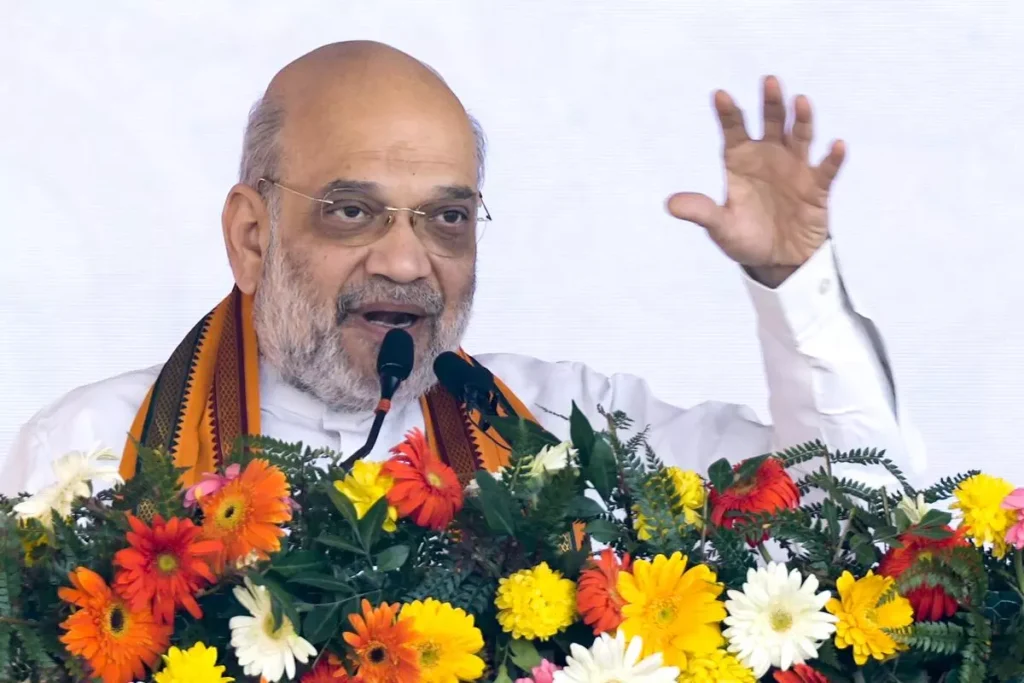
Union Minister Amit Shah’s Vision for Natural Farming in India
- Union Home Minister Amit Shah inaugurated Sabar Dairy’s cattle-feed plant in North Gujarat.
- He emphasized the potential of natural farming to open a ₹10 lakh crore global market for Indian farmers.
- Shah emphasized the need for milk cooperatives to incorporate natural farming in their training programs.
- He highlighted the potential of cow dung to help farmers cover 20 acres of agricultural land.
- Shah also inaugurated the cattle feed plant, which will increase Sabar Dairy’s cattle feed processing capacity to over 2000 metric ton per day.
- Shah highlighted India’s high average per capita milk production, highlighting the role of the cooperative movement.
Natural Farming Overview
- Chemical-free farming system utilizing locally available resources and indigenous practices.
- Based on agroecology, integrating crops, trees, and livestock.
- Uses on-farm resources like cow dung and urine for natural processes.
- Promotes biomass recycling through mulching and other methods.
- Encourages biodiversity and multi-species green manuring.
- Provides plant protection with locally made botanical extracts.
- Maintains soil aeration for crop resilience.
- Also known as The Fukuoka Method, The Natural Way of Farming, and Do-Nothing Farming.
- Practiced in several Indian states.
2. Union Minister Shri Shivraj Singh Chouhan addresses the Global Soil Conference 2024
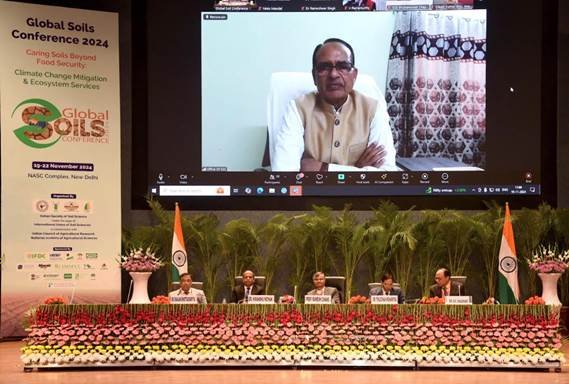
Union Agriculture Minister Shri Shivraj Singh Chouhan’s Address at Global Soils Conference 2024
- Emphasized the shared consciousness among all beings, including humans and animals.
- Stressed the importance of soil health as it is vital for the health of living beings.
- Highlighted India’s significant progress in agriculture since independence, with the Green Revolution ensuring food security.
- Highlighted the diversification of agriculture through horticulture, dairy, aquaculture, poultry, and other sectors.
- Highlighted India’s contribution to global food trade and export earnings, with 330 million tonnes of food grains produced annually.
India’s Soil Health Crisis and Government Initiatives
- Increased use of chemical fertilizers, exploitation of natural resources, and unstable weather are causing soil health crisis in India.
- 30% of soil has been spoiled, with erosion, salinity, and pollution reducing essential nitrogen and micro nutrients.
- Lack of organic carbon in soil weakens fertility and resilience, affecting farmers’ livelihood and food security.
- Government initiatives include the Soil Health Card initiative, Pradhan Mantri Krishi Sinchai Yojana, and an organic basic development compilation for the North East.
- Chemical fertilizers are deteriorating soil and human and animal health, necessitating integrated nutrient and water management methods.
- Measures to improve soil health, reduce soil erosion, and water storage capacity include micro irrigation, crop diversification, and agro-forestry.
- Krishi Vigyan Kendras and agricultural technology management agencies are working to provide knowledge and skills to farmers.
- The program of Modern Agriculture Chaupal is set to start soon, involving scientists in farmer discussions and problem-solving.
Soil Health Card Scheme in India
- Provides farmers with yearly reports on their soil’s health and recommendations for improvement.
- Includes information on 12 parameters: macro-nutrients, micro-nutrients, pH, EC, and OC.
- Includes fertilizer recommendations and necessary soil amendments.
- Implemented through lab testing of soil samples and analysis by experts.
- Launched by Prime Minister Narendra Modi on February 19, 2015.
- Accessible via the SHC portal or SMS link.
- As of December 19, 2023, 23.58 crore soil health cards have been distributed.
Pradhan Mantri Krishi Sinchai Yojana (PMKSY)
- Launched in July 2015 to ensure irrigation facilities in all agricultural areas.
- Includes construction of water sources, harnessing rainwater, increasing farm water supply, efficient water use, sustainable water conservation, and water body repair, renovation, and restoration.
3. Salam Kisan signs agreement with agriculture university
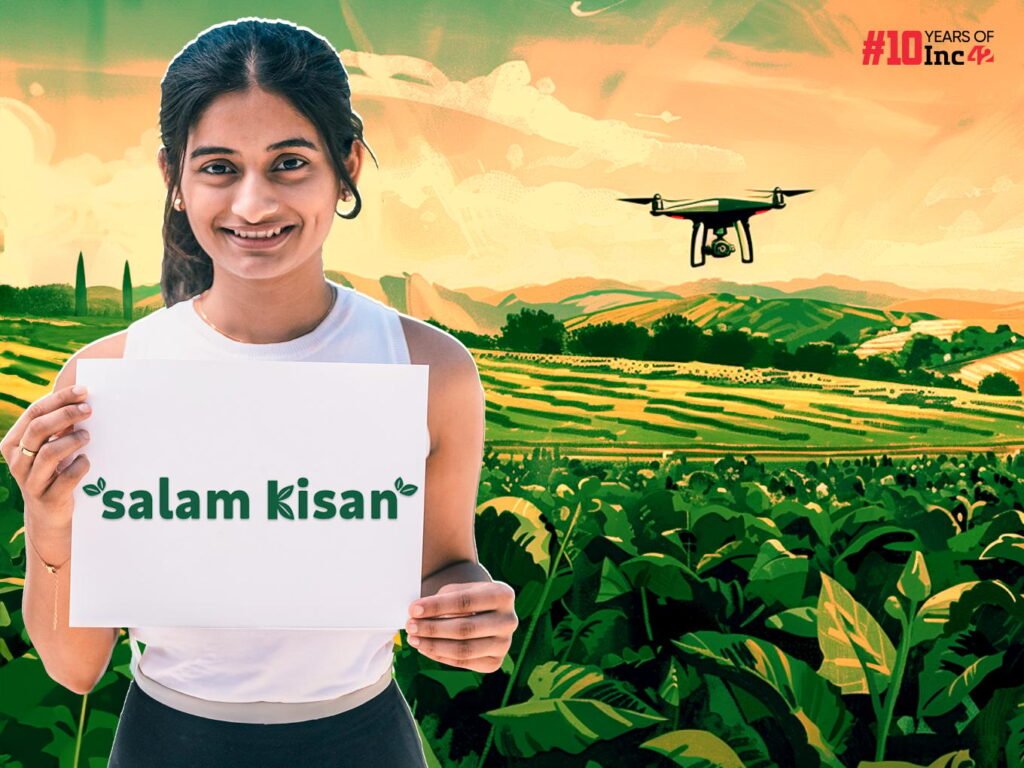
Salam Kisan and Dr Balasaheb Sawant Konkan Krishi Vidyapeeth Partner for Agricultural Transformation
- Salam Kisan, an agri-tech platform under PRYM Group, has signed a memorandum of understanding (MoU) with Dr Balasaheb Sawant Konkan Krishi Vidyapeeth (DBSKKV Dapoli).
- The partnership aims to facilitate a research-backed, tech-driven transformation within the agricultural ecosystem.
- Goals include strengthening the crop calendar using data-driven AI and machine learning solutions, and developing drone standard operating procedures (SOPs).
- The partnership will also provide real-time pest and disease management solutions and promote natural farming practices.
- The partnership is critical for the future of sustainable agriculture in India.
4. Mobile app for fishing community to counter climate change impact

University of Southampton Develops Mobile App for Kerala Fishing Communities
- The University of Southampton has developed a mobile app to assist small-scale fishing communities in Kerala.
- The app connects fishers, allowing real-time information sharing about fish locations, sea conditions, and catch details.
- The app aims to optimize fishing trips and promote sustainable practices.
- The app addresses challenges faced by fishermen in Kerala, including climate change, habitat degradation, marine pollution, and enforcement issues.
- The app encourages photo sharing to document sea conditions and catches, providing valuable data for policy development.
- The research team has developed policy recommendations for local government, including compensation mechanisms, marine litter collection incentives, and mangrove replanting projects.
5. Sweet sorghum farmers waiting for Govt to announce separate ethanol pricing

Sweet Sorghum Biofuel Project in India
- A project proposal by private seed company Advanta Enterprises for financial support of about ₹23.5 crore has not been materialised due to inter-ministerial issues including ethanol pricing.
- Advanta Enterprises secured consent from 8 sugar mills with a combined distillery capacity of 1,170 KLPD to undertake the project through contract farming in 2,709 acres area.
- Some mills, like Shreenath Mhaskoba Sakhar Karkhana and Khandoba Distilleries, propose a tentative buying price of ₹65.50/litre for the ethanol to be produced from sweet sorghum.
- The government is yet to fix rates of ethanol for the current Ethanol Supply Year (November-October).
- The industry official suggests a nodal department for ethanol to be the interface with all stakeholders.
- Advanta has named Indian Institute of Millets Research (IIMR) and National Sugar Institute as technology partners, but no funds are allocated from the project cost.
- Advanta has projected about Rs 15 crore for procurement of sweet sorghum stalk from farmers at Rs 250/quintal.
- Farmers need to be convinced about the long-term benefits of the project, including an assured market without price volatility and additional income from grains.
National Affairs
1. HON’ BLE RAKSHA MANTRI ADDRESSES AIR FORCE COMMANDERS’ CONFERENCE
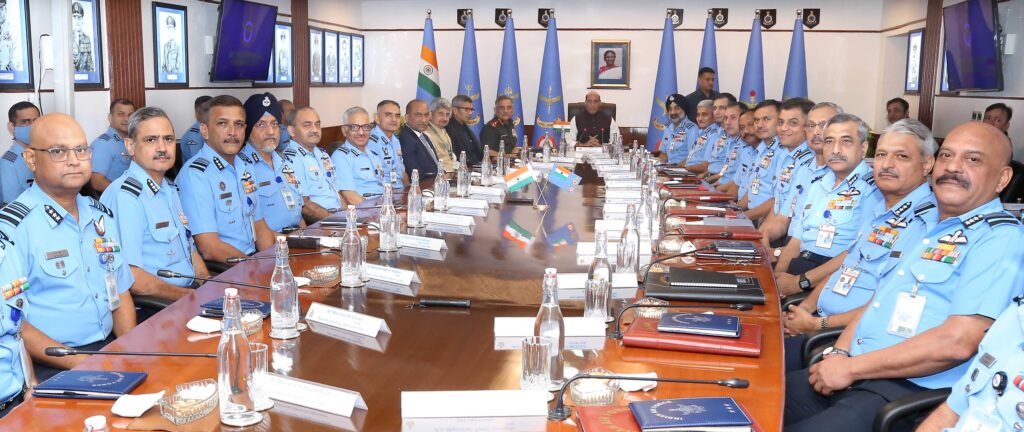
Air Force Commanders’ Conference in New Delhi
- The Hon’ble Raksha Mantri, Shri Rajnath Singh, addressed the Air Force Commanders’ Conference (AFCC) at Air Headquarters.
- The conference was attended by Chief of Defence Staff, General Anil Chauhan, Defence Secretary Shri Rajesh Kumar Singh, Secretary (DDR&D and Chairman DRDO Dr. Samir V. Kamat), Secretary (Defence Production) Mr Sanjay Kumar, and senior commanders of the Indian Air Force (IAF).
- Singh commended the IAF for its dedication and professionalism in safeguarding the nation’s sovereignty.
- He urged Commanders and senior officials of the MoD to make capability and capacity building more efficient.
- The conference facilitated discussions on operational, administrative, and strategic issues.
2. Sagarmanthan 2024: India’s Maritime Vision
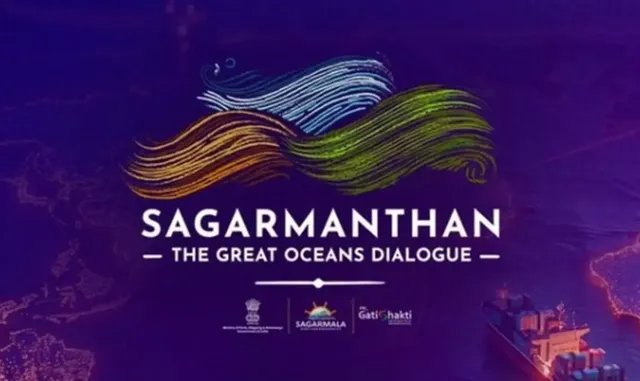
India’s Rising Global Influence and Maritime Legacy
- India’s maritime legacy is vast and dynamic, with a 7,500-kilometer coastline and 12 major ports.
- In 2023, India contributed 16% of global growth and is projected to become the third-largest economy within three years.
- India’s maritime sector is a key linchpin for commerce, connectivity, and international cooperation.
- The first edition of ‘Sagarmanthan: The Great Oceans Dialogue’, South Asia’s largest maritime thought leadership forum, is being held from November 18-19 in New Delhi.
- Sagarmanthan: Thematic Pillars aims to chart a bold, actionable course for a vibrant maritime ecosystem.
India’s Maritime Sector
- Handles 95% of India’s trade by volume and 70% by value.
- 12 major ports and over 200 notified minor and intermediate ports.
- As the sixteenth-largest maritime nation globally, India is a key player in global shipping lanes.
- As of 2023, India has a fleet of 1,530 ships.
- India is the third-largest in ship recycling by tonnage globally.
- Major ports increased their annual cargo-handling capacity by 87.01% between 2014-15 and 2023-24.
- In 2024, Indian ports managed 819.22 million tonnes of cargo, a 4.45% increase from the previous year.
Government Schemes in India’s Maritime Sector
Sagarmala Programme:
- A flagship initiative by the Ministry of Ports, Shipping, and Waterways.
- Supports port infrastructure projects, coastal development, and connectivity enhancements.
- Financial assistance provided to State/UT Governments for projects like coastal berths, road and rail connectivity, fish harbours, skill development, cruise terminals, and Ro-Pax ferry services.
Maritime India Vision (MIV) 2030:
- A comprehensive blueprint aiming to accelerate and harmonize India’s maritime sector growth over the next decade.
- Involves over 150 initiatives across ten key themes, addressing all areas of the maritime sector.
Inland Waterways Development:
- The Inland Waterways Authority of India (IWAI) has identified 26 new national waterways.
- These new routes will provide an alternative mode of transportation and promote sustainable, cost-effective transport options.
Green Tug Transition Program (GTTP):
- Aims to phase out conventional, fuel-based harbour tugs at Indian major ports.
- The transition is set to be completed by 2040, ensuring a fully eco-friendly fleet across the country’s major ports.
3. Climate change impact harsher on poorer farmers in India: FAO report

Climate Change Impacts on India’s Farming Population
- The Food and Agriculture Organization (FAO) warns that poor households globally lose 5% of their total income due to heat stress and 4.4% due to floods.
- The report highlights that poor households in India are more dependent on agricultural production during droughts and other climate stressors, reducing off-farm employment opportunities.
- The vulnerability of poor households to climate stressors is likely due to structural inequalities, prompting the government to expand social security nets.
- The report recommends implementing anticipatory social protection programs and improving workforce diversification.
- It also urges policymakers to address “gendered barriers” in non-farm employment, using gender-transformative methodologies to challenge discriminatory gender norms.
- The report also highlights that floods widen the income gap between poor and non-poor households in rural areas by approximately $21 billion a year, and heat stress by more than $20 billion a year.
- India has implemented National Innovations on Climate Resilient Agriculture (NICRA) and an employment guarantee scheme as a social safety net, but the report should consider these aspects.
FAO: United Nations Agency for Food Security
- Has 195 members, 194 countries, and the European Union.
- Established in 1945 in Quebec City, Canada.
- Founded by Sir John Boyd Orr, who won the Nobel Peace Prize in 1949.
Health
- About 182 million children in poor nations lack nurture; pollution, climate change risk factors: Study
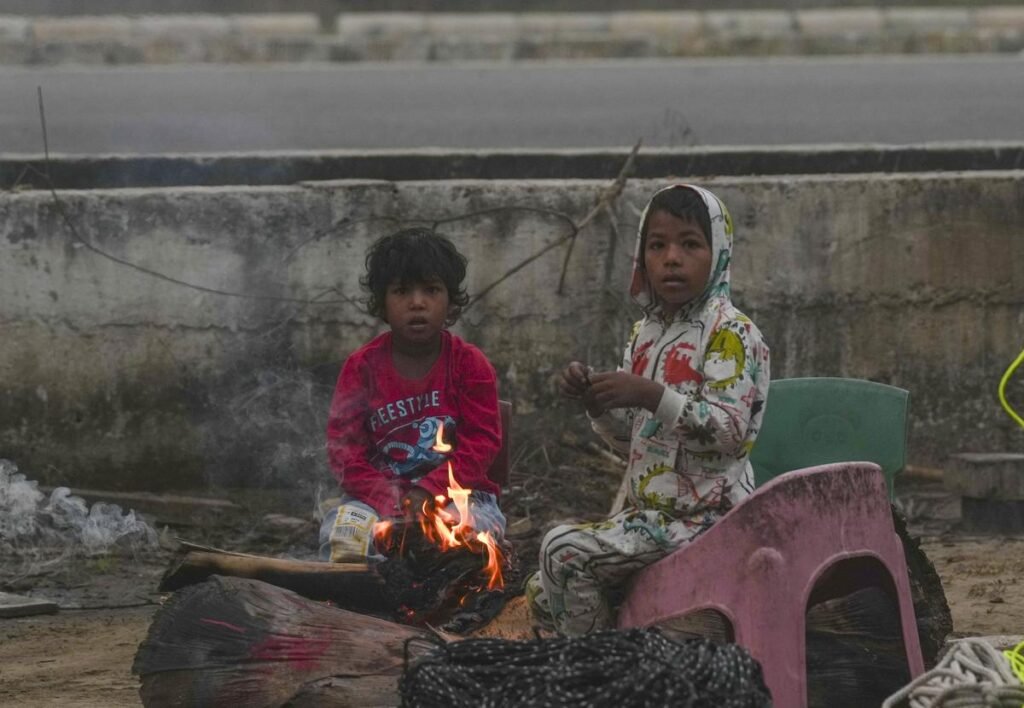
Child Development in Low- and Middle-Income Countries: A New Series Paper
- A new series paper published in The Lancet journal reveals that nearly 182 million children in low- and middle-income countries lack access to adequate nurture, risking healthy development.
- Environmental risk factors such as air pollution, climate change, and exposure to chemicals also affect child development.
- The ‘next 1,000 days’ (from age two to age five) is a crucial window for providing nurturing care to children.
- Fewer than one in three children aged three or four attending early childhood care and education (ECCE) programmes in LMICs.
- The authors call for increased investment in this stage of child development, focusing on improving access to high-quality childhood care and education programmes.
- The authors suggest a holistic approach with an activity-based curriculum, rather than traditional academic-focus rote learning.
- Data regarding children attending ECCE programmes in India is sketchy, with no reliable estimates of current reality.
- A new analysis suggests providing one year of early childhood care and education for all children would cost under 0.15 per cent of the current gross domestic product of LMIC countries.
Lancet Series on Early Childhood Development in Low- and Middle-Income Countries
- The series profiles the ‘next 1,000 days’ as a crucial stage of development, especially in low- and middle-income countries (LMICs).
- Children from LMICs should receive the care they need to thrive, including support for caregivers and access to high-quality early care and education programmes.
- Around 80% of interventions promoting healthy development are taking place in such settings.
- Programmes offer yearly screening, growth monitoring, food assistance, nutrition supplements, and caregiver support.
- Emerging environmental risk factors for poor child development include air pollution, climate change, and chemical exposures.
- Policy level discussions are lacking on how these climate factors impact children’s development and how climate action plans should incorporate ECCE.
Banking and Finance
- FM makes a case for cheaper bank loans
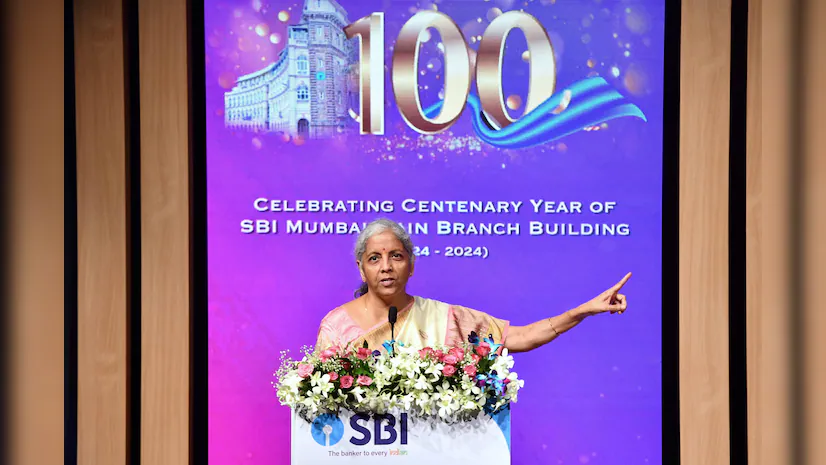
Union Finance Minister Nirmala Sitharaman Calls for Affordable Bank Lending Rates
- Union finance minister Nirmala Sitharaman has called for more affordable bank lending rates to meet India’s growth requirements.
- The central bank’s monetary policy committee (MPC) has maintained interest rates unchanged since February 2023, with food inflation expected to hinder rate reduction before February 2025.
- 58% of all floating rate bank loans are linked to an external benchmark, making cheaper loans only possible when RBI cuts the benchmark rate.
- Reserve Bank of India (RBI) governor Shaktikanta Das ruled out a rate cut in the immediate future due to expected rise in headline inflation.
- Union commerce minister Piyush Goyal criticized the theory of considering food inflation for rate cuts, stating it was a flawed theory.
- Sitharaman emphasized the need for scientific and rigorous storage facilities for perishable commodities to prevent inflation from cyclically stressing the economy.
2. Three neighbouring countries show interest in Gati Shakti
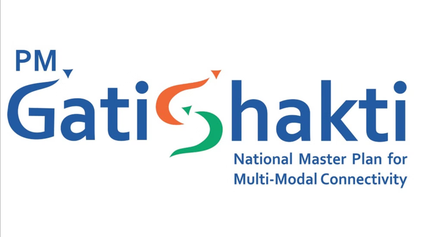
India’s PM Gati Shakti Technology to Globalize
- PM Gati Shakti, a technology platform launched in 2021, is set to be showcased globally, with interest from three neighbouring countries.
- The platform is being offered to all “friendly” neighbouring countries, including Bangladesh, Nepal, and Sri Lanka.
- The National Master Plan of PM Gati Shakti may be offered to these countries for cross-border infrastructure projects.
- The tool has been showcased to 30 countries in Central Asia and South East Asia, and has been showcased at various international events.
- The tool is expected to reform governance, particularly in project implementation and management.
- Countries interested in adopting the Indian system may have limited access to the portal to gain first-hand experience.
PM Gati Shakti: A National Master Plan for India’s Infrastructure
- Launched on October 13, 2021, aiming to enhance India’s infrastructure and connectivity through a multimodal transportation network.
- Driven by seven engines: railways, roads, ports, waterways, airports, mass transport, and logistics infrastructure.
- Features include integrated planning, a common portal for investors, data accuracy, GIS-based spatial planning, and periodic satellite imagery.
- Aims to reduce logistics costs, enhance connectivity, and improve India’s global ranking performance.
3. Centre pushes back on RBI’s proposed provisioning norms
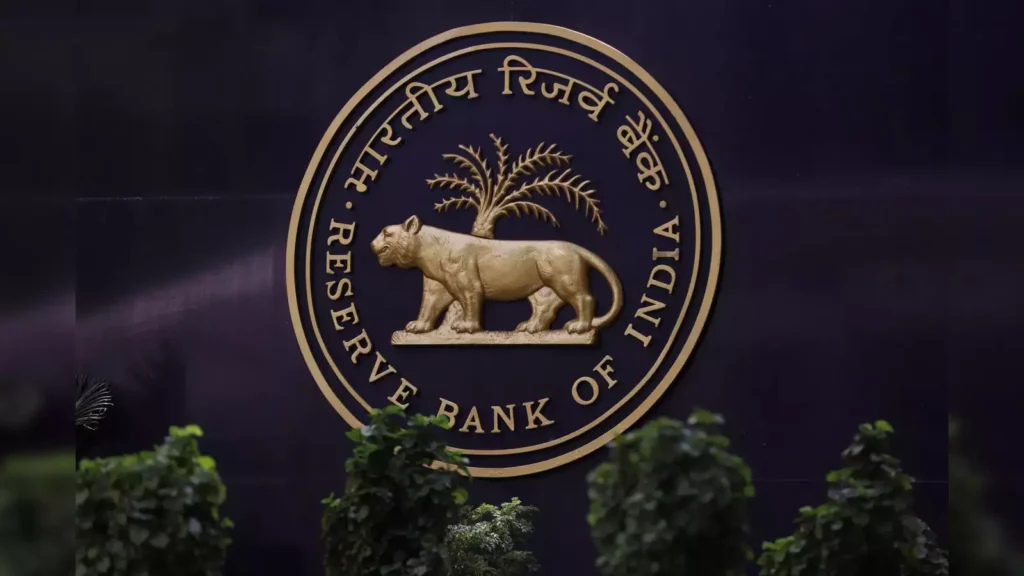
India’s Government Rejects Central Bank’s Infrastructure and Online Deposit Proposals
- The Indian government opposes two central bank proposals requiring banks to set aside more funds for infrastructure projects and hold more liquid assets against online deposits.
- The RBI proposed in May that banks set aside 5% of loans given to under-construction infrastructure projects, causing banks to seek government intervention.
- The central bank also proposed an additional 5% ‘run-off’ on digitally accessible retail deposits to manage risks from heavy withdrawals.
- The government’s banking department has asked the RBI to dilution of these guidelines to avoid “squeezing credit in the economy.”
- The banking department suggests a case-by-case approach for deciding the quantum of funds banks set aside based on the sector’s risk profile.
- The government has not suggested any ceiling for the percentage of funds needed to be set aside.
4. RBI action on personal loans, KYC takes toll on off-roll work
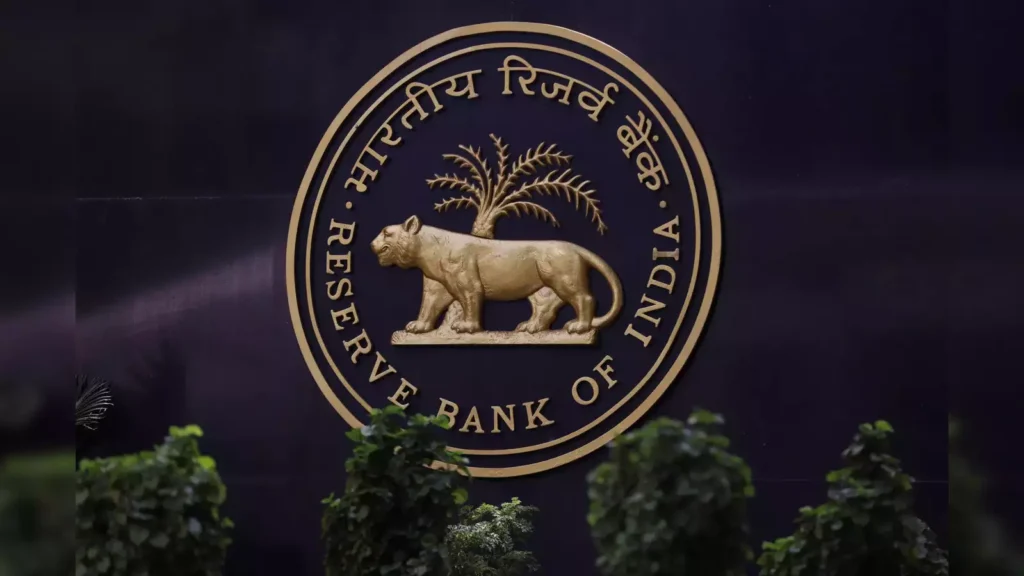
RBI’s Stricter Compliance with Know-Your-Customer (KYC) Norms and Crackdown on Personal Loans
- The Reserve Bank of India (RBI) has increased compliance with KYC norms and crackdown on personal loans, leading to a decrease in demand for off-roll workers.
- The regulator’s push for in-house KYC activity has lowered demand for off-roll staff.
- The curbs against unsecured loans have also reduced the need for third-party workers to act as lenders’ representatives.
- The BFSI sector, which employs a large number of off-roll staff, is one of the biggest employers of this workforce.
- RBI has been focusing on enforcing KYC guidelines, which mandate banks to ask for proofs of address and identity from customers before opening bank accounts.
- The measures have led to a slowdown in sales teams deployed for personal loans, with KYC now done only by bank employees.
- A senior banker at a private lender explains that while there is no specific guideline prohibiting using third-party employees for KYC verifications, the regulatory intent is to get it done in-house as much as possible.
















